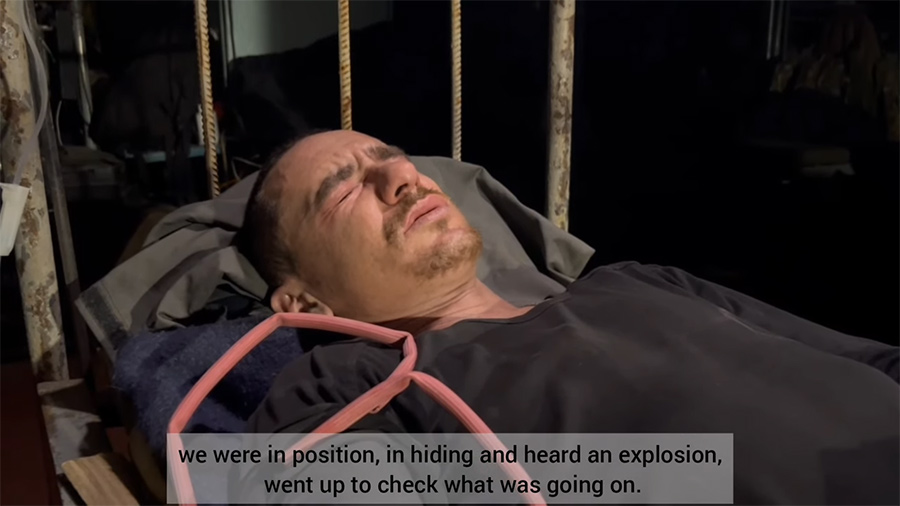According to the Azov Regiment's report published at about 22:15 on 11 April, "about an hour ago used a poisonous substance of unknown origin against Ukrainian military and civilians in the city of Mariupol." Azov said that the substance was dropped from a Russian drone.
"The victims have respiratory failure, vestibulo-atactic syndrome. The consequences of using an unknown substance are being clarified," according to the report.
The mentioned symptoms are partly similar to those of the poisoning with nerve agents such as the sarin gas
, which raised speculations on social media that sarin might have been used in Mariupol against the Ukrainian forces.
Earlier on the same day, the spokesman of the Russian military force in occupied Donetsk, Eduard Basurin, threatened to use chemical weapons against the Ukrainian defenders of Mariupol. He said to Russian media that there is no sense to storm the Azovstal plant held by the Ukrainian forces with all of its underground levels. Instead, Basurin speculated, it would be better to block the steel mill, find all entrances and exits,
"and then to invite, I guess, the chemical troops, who will find a way to smoke moles out of their burrows."
Nevertheless, in order to show that their report wasn't groundless, the Azov Regiment has released a video, in which three victims of the alleged chemical attack who are in "a relatively satisfactory condition" comment on what they saw and how the poisoning affected them.
In the video, commander of the Azov Regiment Denys Prokopenko says,
"The epicenter of the substance's effect was at a distance from the location of where the [civilian] people were. This resulted in their minimal contact with the substance, which might have saved their lives, but there are concequences."
According to him, it's impossible to examine the scene of the attack due to the enemy fire, which is, according to him, the the tactics of the Russian forces to conceal their own crimes.
The video shows a military in "a moderate condition" who was allegedly affected by the Russian attack, and two civilians who have been under medical supervision. All three were exposed to the unknown chemical substance during a short period of time.
An unnamed man captioned as an anaesthesiologist of the military hospital says in the video that three patients presented in his hospital after the attack had the following symptoms: facial hyperemia, high blood pressure, dryness and inflammation of the fauces and mucous membranes of the eyes. Those three received an emergency symptomatic treatment.
A civilian man said he saw a white smoke or smog-like cloud as he got to the steel mill and felt sick at once with tinnitus, tachicardia, and weakness. His mother, another alleged victim, lost her consciousness three times since the poisoning, according to him and was barely resuscitated. All those affected had the same symptoms, he said. The woman says in the video that she can't walk for now.
The third presented victim, a Ukrainian military, says that having heard an explosion he left his shelter to find out what was going on, and saw some white fog looking more like smoke
. He was ordered to get back to his shelter where he felt short of breath, started feeling dizzy, and his legs started to fail.
- British Foreign Secretary Liz Truss said the UK was working “urgently” to verify details of the alleged chemical attack on Mariupol.
- "Absolutely all options are on the table" if Russia has used chemical weapons in Ukraine and sending in troops cannot be ruled out, British Armed Forces Minister James Heappey said.
- A Pentagon spokesperson said the reports weren't confirmed, but they reflect US concerns about Russia’s “potential to use a variety of riot control agents, including tear gas mixed with chemical agents, in Ukraine.”
- Two weeks ago, US President Joe Biden warned that NATO "would respond" if Russia used chemical weapons in Ukraine.
Read more:
- Russo-Ukrainian war, day 48: reports on chemical attack on Mariupol
- Moscow’s genocidal war against Ukraine and new strategy of information warfare
- Putin’s blitzkrieg stalled, Ukraine fights back: first days of Russia’s full-scale war on Ukraine (Feb 2022)
- Daily review: Ukraine refutes Russia’s claims of chemical weapons use (2021)
- Moscow media outlets today with disturbing unanimity say Ukraine readying chemical weapons (2018)
- How Russian propaganda denies a suspected chemical attack in Syria (2018)

